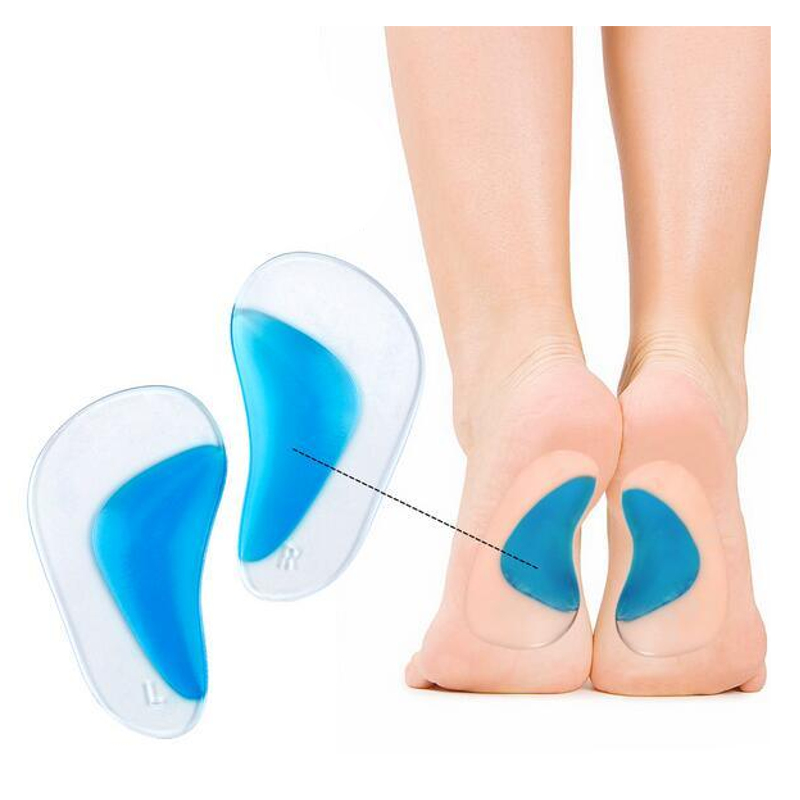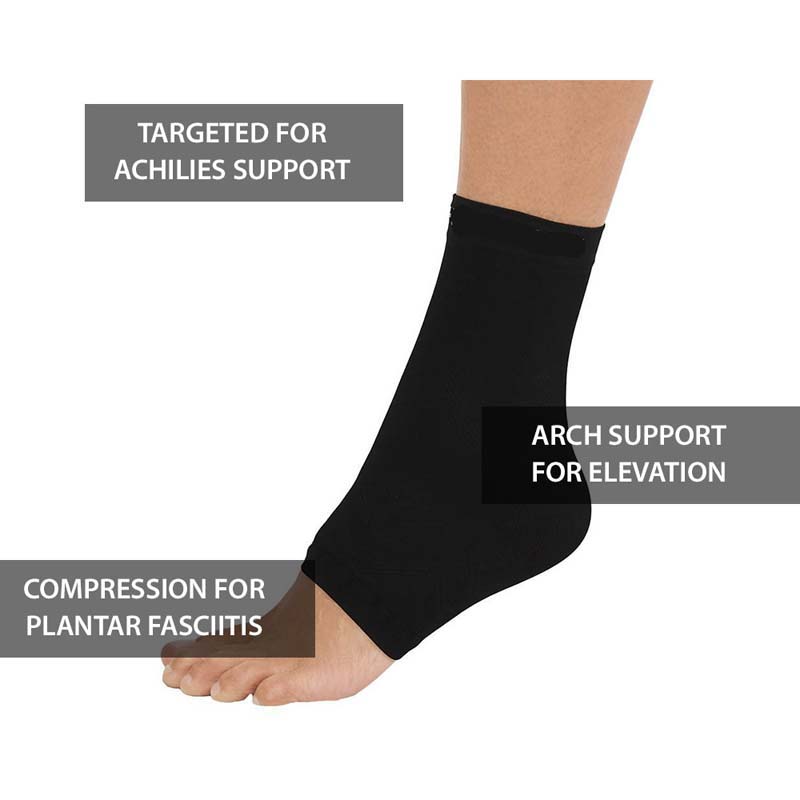Plantar Fasciitis and Your Sleep: Improving Rest Quality

Featured Products for Plantar Fasciitis Foot Pain Relief
Plantar fasciitis, characterized by persistent heel pain, can extend its impact beyond waking hours, affecting the quality of your sleep. The discomfort and pain may make it challenging to find a comfortable sleeping position and, in turn, disrupt your rest. In this blog post, well explore the relationship between plantar fasciitis and sleep and provide practical tips to enhance your sleep quality despite the challenges posed by this condition.
Understanding the Sleep-Plantar Fasciitis Connection:
-
Nighttime Discomfort:
- Plantar fasciitis pain is often more noticeable at night, especially when you first step out of bed in the morning. The plantar fascia tightens during periods of inactivity, causing discomfort when you resume weight-bearing activities.
-
Sleeping Positions:
- Certain sleep positions, such as sleeping on your stomach with your feet pointed, can exacerbate plantar fasciitis symptoms. Finding a comfortable position that minimizes pressure on the affected foot can be crucial for restful sleep.
-
Impact on Sleep Quality:
- The pain and discomfort from plantar fasciitis can lead to sleep disturbances, reducing the overall quality of your rest. Poor sleep quality may, in turn, contribute to increased stress and a heightened perception of pain.
Practical Tips for Better Sleep with Plantar Fasciitis:
-
Orthopedic Pillow Support:
- Use orthopedic pillows to support proper spinal alignment and reduce pressure on the heels. Placing a pillow under your knees while sleeping on your back or between your knees when sleeping on your side can help alleviate stress on the plantar fascia.
-
Choose Supportive Bedding:
- Invest in a supportive mattress and pillows. A mattress that provides adequate support can contribute to better sleep posture and reduce pressure on the feet.
-
Night Splints:
- Consider using night splints, which are devices that keep the foot flexed upward while you sleep. This helps maintain the plantar fascia in a stretched position, potentially reducing morning pain.
-
Stretch Before Bed:
- Perform gentle stretches before bedtime to alleviate tension in the calf muscles and the plantar fascia. This can contribute to increased flexibility and reduced discomfort during the night.
-
Ice Therapy:
- Apply an ice pack to the affected heel before bedtime. Ice therapy can help soothe inflammation and numb the area, providing temporary relief and potentially easing discomfort during the night.
-
Supportive Footwear at Home:
- Wear supportive footwear, even at home. This is especially important when moving around during the night. Avoid walking barefoot to minimize strain on the plantar fascia.
-
Elevate Your Feet:
- Elevate your feet slightly while sleeping to promote better blood circulation and reduce swelling. This can be achieved by placing a pillow or cushion under your ankles.
-
Sleeping Positions:
- Experiment with different sleeping positions to find the one that minimizes pressure on your heels. Sleeping on your back with a pillow under your knees or on your side with a pillow between your knees can be beneficial.
-
Mindfulness and Relaxation Techniques:
- Practice mindfulness and relaxation techniques before bedtime. Activities such as deep breathing or gentle stretching can help calm the mind and reduce overall stress, contributing to better sleep.
-
Consult with a Healthcare Professional:
- If sleep disturbances persist, consult with healthcare professionals, including podiatrists or sleep specialists. They can provide personalized advice and interventions to address your specific sleep challenges related to plantar fasciitis.
Creating a Sleep-Friendly Environment:
-
Dark and Quiet Environment:
- Ensure your sleep environment is dark and quiet. Creating a serene atmosphere can promote relaxation and minimize external factors that may contribute to sleep disturbances.
-
Consistent Sleep Schedule:
- Maintain a consistent sleep schedule by going to bed and waking up at the same time every day. Consistency can help regulate your bodys internal clock and improve overall sleep quality.
-
Limit Screen Time Before Bed:
- Reduce screen time before bedtime, as the blue light emitted from electronic devices can interfere with the production of the sleep hormone melatonin. Opt for calming activities instead.
-
Create a Relaxing Bedtime Routine:
- Establish a calming bedtime routine to signal to your body that its time to wind down. This could include activities such as reading, gentle stretching, or listening to soothing music.
Conclusion:
While plantar fasciitis can pose challenges to a restful nights sleep, implementing these practical tips and creating a sleep-friendly environment can significantly improve your sleep quality. By addressing the specific needs associated with plantar fasciitis and adopting healthy sleep habits, you can enhance your overall well-being and manage the impact of this condition on your nightly rest. If sleep disturbances persist, its advisable to seek guidance from healthcare professionals who can provide tailored solutions for your individual situation.
Featured Products for Plantar Fasciitis Foot Pain Relief
Latest Blogs
- Taking a Stand Against Heel Pain: Practical Solutions
- Happy Heels, Happy Life: Banishing Foot Pain for Good
- The Road to Relief: Strategies for Combating Heel Pain
- Heel to Toe Wellness: Tackling Foot Pain Head-On
- Foot Pain Decoded: Understanding the Signals Your Feet Send
- Soothing Steps: Natural Remedies for Heel and Foot Pain
- Putting Your Best Foot Forward: Managing Heel Discomfort
- The ABCs of Happy Feet: Beating Heel and Foot Pain
- From Heel to Toe: Navigating Common Foot Pain Issues
- Taking a Step Back: Causes and Remedies for Heel Pain
- Footloose and Pain-Free: Tips for Happy Heels and Feet
- Soleful Solutions: A Guide to Alleviating Heel and Foot Discomfort
- Stepping Into Comfort: Understanding Heel and Foot Pain
- From Pain to Progress: Inspiring Plantar Fasciitis Journeys
- Living a Full Life with Plantar Fasciitis: Success Stories
- Plantar Fasciitis and Exercise: Finding the Right Balance
- The Impact of Stress on Plantar Fasciitis Symptoms
- Plantar Fasciitis: When to Seek Professional Help
- Inflammatory Foods and Plantar Fasciitis: What to Avoid
- Ergonomics and Plantar Fasciitis: A Comprehensive Guide
- The Importance of Rest in Plantar Fasciitis Recovery
- Traveling with Plantar Fasciitis: Tips for Happy Feet
- Plantar Fasciitis and Your Sleep: Improving Rest Quality
- The Psychological Aspect of Living with Plantar Fasciitis
- Plantar Fasciitis and High-Impact Activities: Navigating Risks
- How to Stay Active with Plantar Fasciitis: Practical Tips
- Plantar Fasciitis and Aging: Strategies for Seniors
- Cryotherapy for Plantar Fasciitis: Icy Relief for Your Feet
- Aquatic Exercise for Plantar Fasciitis: Dive into Healing
- Mindfulness and Meditation for Plantar Fasciitis Relief
- Heel Pain 101: A Guide to Plantar Fasciitis
- Finding Relief - Plantar Fasciitis Home Remedies
- The Emotional Toll of Chronic Plantar Fasciitis
- Post-Workout Foot Care for Plantar Fasciitis Sufferers
- DIY Foot Massage Techniques for Plantar Fasciitis
- From Diagnosis to Recoveryc- Navigating Plantar Fasciitis
- Plantar Fasciitis in Children Signs and Solutions
- Plantar Fasciitis and Weight: Impact on Foot Health
- How Nutrition Affects Plantar Fasciitis Recovery
- Yoga for Plantar Fasciitis: Poses for Pain Relief
- Breaking Down Plantar Fasciitis Myths and Misconceptions
- Plantar Fasciitis Stretches - Daily Routine for Relief
- The Link Between Plantar Fasciitis and Flat Feet
- Plantar Fasciitis in Pregnancy - What to Expect
- Desk Job Dilemma - Coping with Plantar Fasciitis at Work
- Plantar Fasciitis in Athletes Strategies for Recovery
- Massage and Plantar Fasciitis A Soothing Combination
- Plantar Fasciitis at Night: Tips for Better Sleep
- Plantar Fasciitis vs Heel Spurs - Understanding the Difference
- The Role of Stretching in Plantar Fasciitis Recovery
- Running with Plantar Fasciitis: Dos and Donts
- Preventing Plantar Fasciitis: Tips for Foot Health
- Natural Remedies for Plantar Fasciitis You Havent Tried
- Heel Pain Demystified: Plantar Fasciitis Explained
- Best Shoes for Plantar Fasciitis: A Comprehensive Guide
- Managing Plantar Fasciitis Pain: Tips and Tricks
- The Complete Guide to Plantar Fasciitis Treatment Options
- 10 Effective Exercises for Plantar Fasciitis Relief at Home
- Understanding Plantar Fasciitis: Causes and Symptoms
- Why do I get Pain in My Feet at Night
- Is pain in your feet a sign of diabetes
- What causes pain in my feet
- Plantar Fasciitis - Why so Painful
- What is that pain in my heel
- Should I Walk with Foot Pain
- How to Treat Ankle Pain
- 10 Best Exercises of Plantar Fasciitis
- Do Compression Socks Help Foot Pain
- Do Insoles Work for Foot Pain
- Best Stretches for Plantar Fasciitis
- 5 Causes of Plantar Fasciitis
- Do Back Posture Braces Actually Work
- Foot pain from walking
- Best Insoles for Plantar Fasciitis
- Pain in heel of foot after Running
- Treatment for Pain in arch of foot
- Pain on top of foot
- Mortons neuroma treatment
- How to remove an Ingrown Toenail
- Foot Heel Spur Pain
- Sore Foot in the Morning
- Suffer Heel Pain in the Morning ?
- Start a running routine
- Running through Fatigue
- Best Achilles Tendonitis and Ankle Excercises
- Causes of Achilles Tendonitis and Ankle Pain
- Plantar Fasciitis Cure and Treatment
- Best Plantar Fasciitis Products
- Causes of Plantar Fasciitis and Heel Spur Pain
- Best Plantar Fasciitis Excercises



















